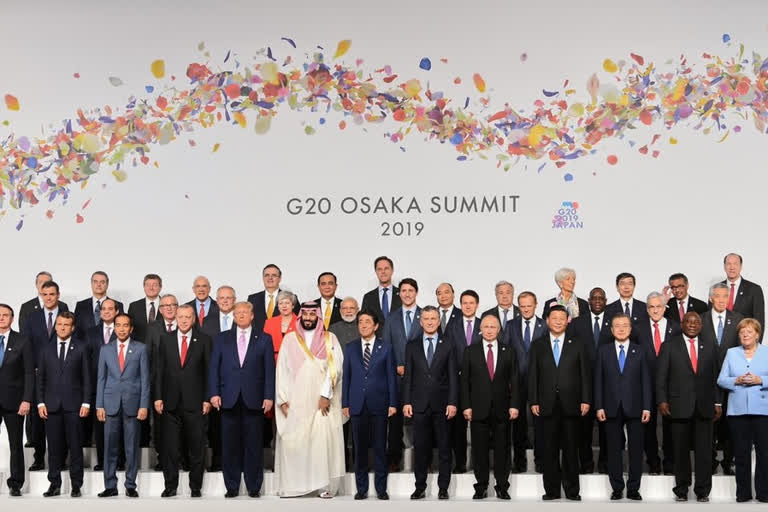Hyderabad:The port city of Osaka in Japan will be hosting the G-20 Summit on 28th and 29th of June 2019. This summit brings together, the leaders of the Group of 20 leading nations across the world. The Group of twenty or G 20 consists of 19 member countries and the European Union that acts as a forum for cooperation on international financial and economic issues. This informal club of developed and developing nations got a significant weight in the international policy discourse as this group represents nearly two-thirds of the world population, constitutes around 90 percent of global GDP, and contributes 80 percent to the global trade.
Initially, it started as a ‘Finance Ministers Forum’ in the aftermath of the Asian Financial Crisis of 1997. Later on, it has been elevated to the level of ‘Leaders Forum’ as it started gaining credibility and prominence with the global leaders meeting after the Global Financial Crisis in 2008. The leaders of the G 20 meet once a year at summit level while the Finance Ministers and the central bank governors meet twice in a year.
The chair of the G 20 rotates among all its members and the chair country takes the responsibility of setting the annual agenda. While Japan is attempting to lay emphasis on its priority areas and issues like growing ocean plastic and tackling the challenges thrown by the aging populations, other burning issues are likely to take the center stage. In fact, the world would watch out for the developments at the G 20 summit more eagerly than ever, given the changing geopolitical equations across the world, in the backdrop of gloomy and bleak economic prospects for global economic growth. The Summit comes at a time when it is of the utmost necessity for the global leaders to sit and discuss the issues that threaten economic prosperity and peace of the nations.
Unfortunately, the developments in the recent past have been escalated to the level, where they pose a danger to the global economic and political stability. The trade war of U.S with China, the economic crisis in Venezuela and a slowing down the global economy are the issues that sent tremors across global financial markets in the recent past and resulted in evaporation of billions of dollars’ worth investors’ wealth in the financial markets across the world. On the other hand, the tensions between U.S and Iran escalating to the brink of a full-fledged war and the uncertainty over the North Korean regime’s stance on nuclear nonproliferation are the issues that have been keeping the U.S with Iran and North Korea at loggerheads, which is not a good sign for world peace. These politico-economic issues that are drawing global attention are expected to be discussed at length at this summit of the highest level, in order to find a way out. However, these expectations are to be taken along with a pinch of salt, given the ground realities.
Shrinking Role of the West:
While there are a plethora of issues that crave for attention and deserve initiatives at the multilateral level, the Western nations that have been considered as the poster children of globalization, multiculturalism, and cosmopolitanism are now retracting from their indulgence from global affairs. While some of these countries trekked this path, out of domestic compulsions, some have chosen it as a deliberate policy choice. The Western nations have been historically the front runners in assuming global leadership and have been sensible and responsible players in global affairs since the completion of the Second World War. Countries like the United States, Britain, Germany, France, and other European nations have played a vital role in ensuring the de-escalation of inter-country disputes and in fact, acted as engines of global economic growth, with rapid industrialization and financial prowess, with the United States as the leading Power. However, the global economic order gradually tilted its balance towards Asia from the mid-2000s. With the Global Financial Crisis shaking the foundations of banking and financial systems of the West, the fault lines underlying their economic systems got exposed and it gave rise to the revival of the right-wing political parties in the West, more particular, the United States. As a result, Donald Trump came to power in the U.S, riding on the back of promises of more protectionism and minimal American intervention in global affairs. Due to the U.S’s indifference towards multilateralism under Trump, there came a vacuum in the global economic and political order.
However the contenders to fill this vacuum are mired in their domestic issues and could not fill the gap created by Trump’s U.S. For instance, Britain is still reeling under the uncertainty of re-negotiation of Brexit deal and in fact facing political uncertainty at home. On the other hand, Germany, which has been a strong player in global affairs is heading towards a major economic downturn in view of lowest levels of public confidence due to political developments under Angela Merkel and a dip in German automobile sales due to fall in global demand, as a result of dampened global economic growth. Even the European Union as a whole could not evolve as a substitute due to its inherent weaknesses as a monetary union but not able to achieve political consensus on key issues governing the European Union.
